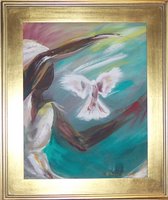 I attended the Gullah/Geechee Nation International African Music & Movement Festival this past weekend where warm wind was blowing off of the river at the Maritime Center and booths were set up by Gullah/Geechee and African-American vendors selling books, dolls, jewelry, sweetgrass baskets and African masks. I was greeted by a group of women dancing, stomping and chanting in a circle. I later watched these same women, the Wisdom Circle Council of Elders, stomp in procession to drum beats. "Free-dom, Gullah/Geechee. Free-dom, Gullah/Geechee." The women were beautiful, dressed in colorful Sunday best with smiles to make your heart melt.
I attended the Gullah/Geechee Nation International African Music & Movement Festival this past weekend where warm wind was blowing off of the river at the Maritime Center and booths were set up by Gullah/Geechee and African-American vendors selling books, dolls, jewelry, sweetgrass baskets and African masks. I was greeted by a group of women dancing, stomping and chanting in a circle. I later watched these same women, the Wisdom Circle Council of Elders, stomp in procession to drum beats. "Free-dom, Gullah/Geechee. Free-dom, Gullah/Geechee." The women were beautiful, dressed in colorful Sunday best with smiles to make your heart melt.The young boys drumming on stage were part of the Jolee Dance troupe and had just come back from Ghana after spending two weeks there helping with AIDS awareness. Their female counterparts, middle- and high-schoolers in black leotards and colorful sarongs, danced their hearts out to African rhythms and brought tears to my eyes. At one point, the girls brought up audience members to learn a few African dance steps, including yours truly. Thank goodness my husband had borrowed the camera that day. No one wants to relive my dance-moves.
When Queen Quet, Chieftess of the Gullah/Geechee Nation, came on stage, not another sound was heard. She carried a sweetgrass basket on her head filled with cotton and Carolina Gold rice and sang spirituals. She spoke in Gullah, but with her recognizable inflection and perhaps the fact that I've been studying the language for the past year, I could follow along with her story of her ancestors and what life used to be like here for them in the South. She used parables to convey the message that people don't sit on the porch and visit like they used to. Many forget where they come from and often try to cover it up, ashamed. Queen Quet's pride of her heritage shines through her performance and has you laughing and thinking the whole time, yearning to revisit the family values of yesteryear.
For a unique, eye-opening experience, be sure to visit the next Annual Gullah/Geechee festival here in Charleston. You don't need to be of Gullah/Geechee lineage to learn about the culture and to see how we each play a role in it's survival.
1 comment:
Nicole, you obviously have such a heart for the Gullah/Geechee Nation. What a beautiful post! YOu speak so poignantly of heritage and family. I can see many more Sweetgrass-type novels coming out of you!
Post a Comment